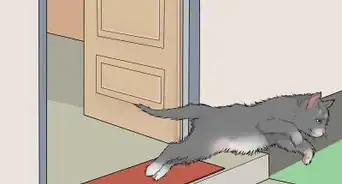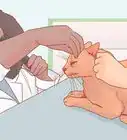This article was co-authored by Brian Bourquin, DVM. Brian Bourquin, better known as “Dr. B” to his clients, is a Veterinarian and the Owner of Boston Veterinary Clinic, a pet health care and veterinary clinic with three locations, South End/Bay Village, the Seaport, and Brookline, Massachusetts. Boston Veterinary Clinic specializes in primary veterinary care, including wellness and preventative care, sick and emergency care, soft-tissue surgery, dentistry. The clinic also provides specialty services in behavior, nutrition, and alternative pain management therapies using acupuncture, and therapeutic laser treatments. Boston Veterinary Clinic is an AAHA (American Animal Hospital Association) accredited hospital and Boston’s first Fear Free Certified Clinic. Brian has over 19 years of veterinary experience and earned his Doctor of Veterinary Medicine from Cornell University.
There are 7 references cited in this article, which can be found at the bottom of the page.
This article has been viewed 20,393 times.
All cats experience stress, but too much stress can be a bad thing. Cats show that they are stressed through changes in their behaviors. To know if your cat is stressed, look for physical changes like lack of appetite or changes in urination. You should also notice any behavioral changes, like excessive grooming or isolation. Finally, figure out if your home has experienced any recent major changes that may lead to stress.
Steps
Recognizing Physical Changes
-
1Notice any digestive problems. Stress and anxiety in a kitten can lead to digestive issues. Diarrhea and constipation are common reactions to stress. As you clean out the litter box, notice any abnormalities or changes in their habits.[1]
- They may also start defecating outside of the litter box.
-
2Monitor for a lack of appetite.[2] Kittens that are stressed may stop eating as much as usual. They may eat less in volume each day, or they may stop eating completely. This can lead to problems since a cat that goes without eating for more than a day can get sick.[3]
- Remember, there are many reasons other than stress for a kitten to stop eating, so a vet check is essential.
- If you notice your kitten is not eating, take them to the vet as soon as possible.
Advertisement -
3Determine if your cat is urinating outside of the litter box. Unclean litter boxes can lead to stress for a cat. If the litter box isn’t cleaned regularly and it is dirty, your cat may eliminate outside of it. This may also happen if there are not enough litter boxes or they are placed in high traffic areas.[4]
- Stress can cause inflammation of the bladder lining which results in an increased need to urinate and passing blood. The signs are similar to other urinary conditions so you’ll need to have the kitten examined by a vet.
Identifying Behavioral Changes
-
1Look for distressed grooming. Cats who are stressed may groom more than is normal. Most cats groom often, but a kitten who is stressed may groom themselves until they have bald spots or sores.[5]
- Some cats may even experience hair-pulling behaviors.
- Your cat may also scratch excessively.
- This excessive grooming is usually centered around the abdomen.
-
2Watch for isolating behavior. Stressed cats may start acting differently than normal. They may isolate themselves more than usual.[6] This means they may start hiding in rooms, running from people or other pets, or finding dark, solitary spaces to spend their time in.[7]
- If your cat was solitary to begin with, they may start being needy and clingy with you.
-
3Listen for excessive whining and meowing. If your cat has started vocalizing excessively, they are probably trying to tell you something. This usually points to stress due to a huge change in the house, like a move, someone leaving or arriving, or another change.[8]
- Your cat may meow, screech, whine, or make other signs.
-
4Watch for changes in sleeping patterns. Cats are lazy and like to sleep. However, a stressed kitten may sleep more than is normal. They may sleep most of the day or through an excessive number of hours each day.[9]
- Think about your cat’s normal sleeping habits. Look for any changes that could indicate something is wrong.
-
5Look for outwardly aggressive behavior. If your kitten starts acting aggressively or violently towards you, people, or other pets, they may be stressed. This may be irritability or violence towards a person or other animal when bothered.[10]
Considering Changes in the Environment
-
1Pay attention to other cats in the home. If there are multiple cats in the house, there may be conflicts between the cats causing your kitten stress. If another cat is hostile, this can upset the cat. Notice how the cats in your house interact with your kitten.[11]
- If there are cats outside, this can upset your cat because they think that a cat is encroaching on their territory.
-
2Expect stress if you have moved recently. Moving to a new location can also cause a lot of stress to your cat. This can be because of a change in location or familiarity. Cats may also not do well if you move and expect them to go outside or inside when they are used to the opposite.
-
3Think about any changes in the home. Cats may become stressed if the situation in the home has changed. This may include different people moving in or leaving, or getting a new pet. Even something like remodeling your house or playing loud music can cause stress for some cats.
- New smells, new furniture, or too much activity in the home can also cause stress.
Reducing Stress for Your Cat
-
1Take your cat to the vet. Many of these symptoms may indicate a problem. Some of the symptoms, like lack of appetite or excessive grooming, can lead to other conditions or problems. If your cat shows signs of stress, you should take them to the vet for an examination.
- Make sure to tell your vet all the symptoms your cat has, along with any recent changes in your home.
-
2Reduce the number of cats you own. Having too many cats in your home can cause unnecessary stress to all of them. You should evaluate the number of cats you own and consider reducing that number. Fewer cats in your home may help lower your kitten’s stress.[12]
- This is particularly important if your cats don’t all get along or you have hostile cats.
-
3Make sure your cat has enough stimulation. Cats may get stressed if they don’t have their needs met. This includes keeping them busy. You should make sure your cat has the right things in your home to make them feel safe and happy. Provide beds, hiding places, perches, scratching posts, toys, and litter boxes for each cat in the home.
- Sharing a litter box is a major source of stress for a cat. Always obey the golden rule of 1 litter box per cat, plus 1 spare. For instance, if you have 2 cats, you need a minimum of 3 litter boxes.
- Play with each cat for 5-10 minutes twice per day. Spend some time grooming each cat and making a fuss over them.
How Do You Tell If A Cat Is Stressed?
Expert Q&A
-
QuestionWhy is my kitten not using its litter box?
 Brian Bourquin, DVMBrian Bourquin, better known as “Dr. B” to his clients, is a Veterinarian and the Owner of Boston Veterinary Clinic, a pet health care and veterinary clinic with three locations, South End/Bay Village, the Seaport, and Brookline, Massachusetts. Boston Veterinary Clinic specializes in primary veterinary care, including wellness and preventative care, sick and emergency care, soft-tissue surgery, dentistry. The clinic also provides specialty services in behavior, nutrition, and alternative pain management therapies using acupuncture, and therapeutic laser treatments. Boston Veterinary Clinic is an AAHA (American Animal Hospital Association) accredited hospital and Boston’s first Fear Free Certified Clinic. Brian has over 19 years of veterinary experience and earned his Doctor of Veterinary Medicine from Cornell University.
Brian Bourquin, DVMBrian Bourquin, better known as “Dr. B” to his clients, is a Veterinarian and the Owner of Boston Veterinary Clinic, a pet health care and veterinary clinic with three locations, South End/Bay Village, the Seaport, and Brookline, Massachusetts. Boston Veterinary Clinic specializes in primary veterinary care, including wellness and preventative care, sick and emergency care, soft-tissue surgery, dentistry. The clinic also provides specialty services in behavior, nutrition, and alternative pain management therapies using acupuncture, and therapeutic laser treatments. Boston Veterinary Clinic is an AAHA (American Animal Hospital Association) accredited hospital and Boston’s first Fear Free Certified Clinic. Brian has over 19 years of veterinary experience and earned his Doctor of Veterinary Medicine from Cornell University.
Veterinarian If you have cats that don’t get along or there have been any major changes in the house, your cat may also not use the litter box.
If you have cats that don’t get along or there have been any major changes in the house, your cat may also not use the litter box. -
QuestionHow can I tell when my kitten gets stressed?
 Brian Bourquin, DVMBrian Bourquin, better known as “Dr. B” to his clients, is a Veterinarian and the Owner of Boston Veterinary Clinic, a pet health care and veterinary clinic with three locations, South End/Bay Village, the Seaport, and Brookline, Massachusetts. Boston Veterinary Clinic specializes in primary veterinary care, including wellness and preventative care, sick and emergency care, soft-tissue surgery, dentistry. The clinic also provides specialty services in behavior, nutrition, and alternative pain management therapies using acupuncture, and therapeutic laser treatments. Boston Veterinary Clinic is an AAHA (American Animal Hospital Association) accredited hospital and Boston’s first Fear Free Certified Clinic. Brian has over 19 years of veterinary experience and earned his Doctor of Veterinary Medicine from Cornell University.
Brian Bourquin, DVMBrian Bourquin, better known as “Dr. B” to his clients, is a Veterinarian and the Owner of Boston Veterinary Clinic, a pet health care and veterinary clinic with three locations, South End/Bay Village, the Seaport, and Brookline, Massachusetts. Boston Veterinary Clinic specializes in primary veterinary care, including wellness and preventative care, sick and emergency care, soft-tissue surgery, dentistry. The clinic also provides specialty services in behavior, nutrition, and alternative pain management therapies using acupuncture, and therapeutic laser treatments. Boston Veterinary Clinic is an AAHA (American Animal Hospital Association) accredited hospital and Boston’s first Fear Free Certified Clinic. Brian has over 19 years of veterinary experience and earned his Doctor of Veterinary Medicine from Cornell University.
Veterinarian Your kitten may try to hide by itself when it feels stressed or it may lose its appetite.
Your kitten may try to hide by itself when it feels stressed or it may lose its appetite.
References
- ↑ http://www.catbehaviorassociates.com/stress-in-cats/
- ↑ Brian Bourquin, DVM. Veterinarian. Expert Interview. 20 December 2019.
- ↑ http://www.catbehaviorassociates.com/stress-in-cats/
- ↑ http://www.aspca.org/pet-care/cat-care/common-cat-behavior-issues/urine-marking-cats
- ↑ http://www.catbehaviorassociates.com/stress-in-cats/
- ↑ Brian Bourquin, DVM. Veterinarian. Expert Interview. 20 December 2019.
- ↑ http://www.petmd.com/cat/centers/nutrition/signs-your-cat-is-stressed
- ↑ http://www.pet-happy.com/signs-of-stress-in-cats/
- ↑ http://www.catbehaviorassociates.com/is-your-cat-stressed-out/
About This Article
To tell if your kitten is stressed, keep an eye out for physical symptoms of stress, like diarrhea, constipation, loss of appetite, or urinating outside of the litter box. Your kitten might also start behaving differently, so watch for any changes like excessing whining or meowing, sleeping more than usual, hiding, excessive grooming, biting, or scratching. There are a lot of reasons why your kitten might be stressed, like a recent move, the introduction of a new cat in the household, or even just rearranged furniture at home. If you think your cat is stressed, take it to see a vet so they can help you figure out what's going on and recommend the best course of action. For advice from our Veterinary co-author, like how to eliminate stress for your kitten, keep reading!
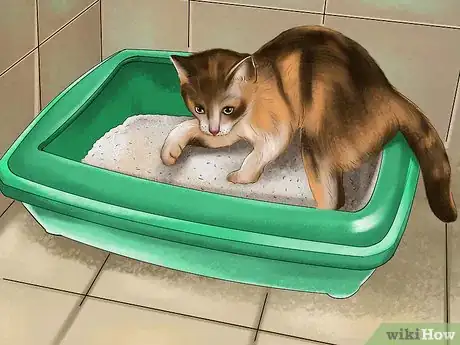
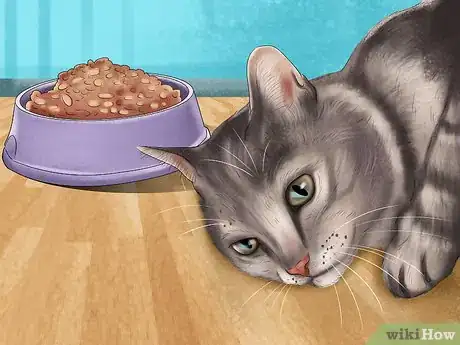


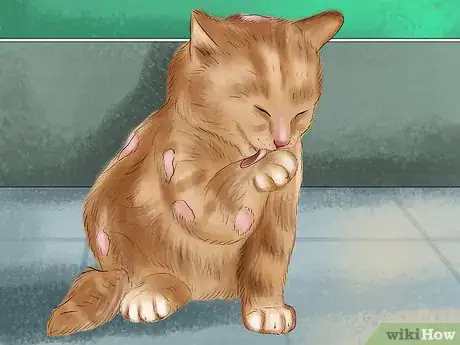
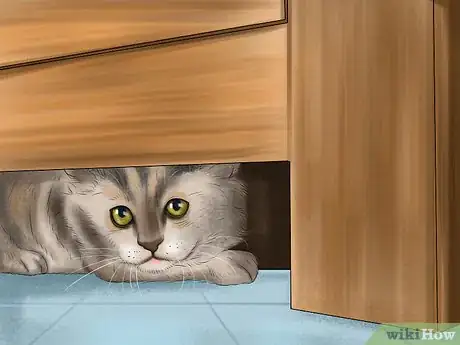

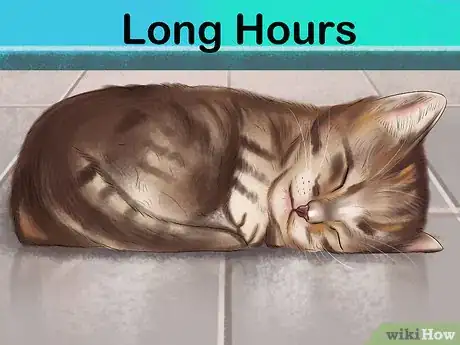
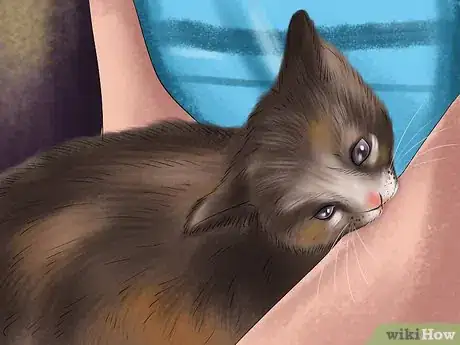
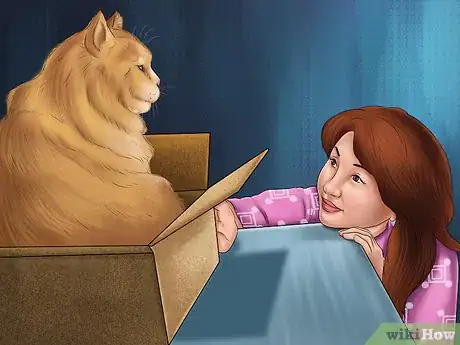

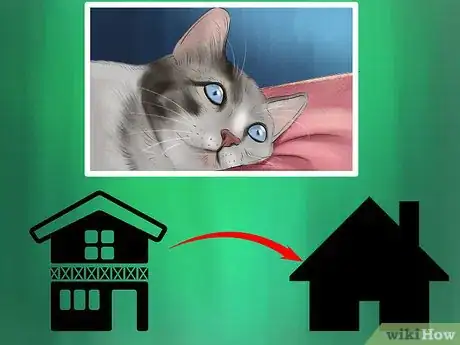
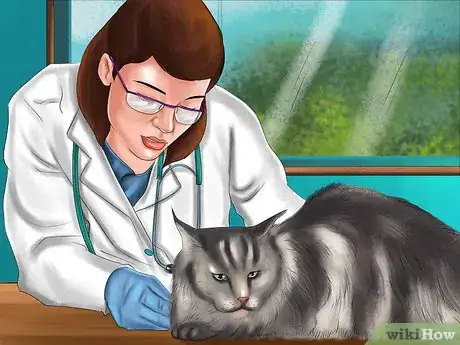


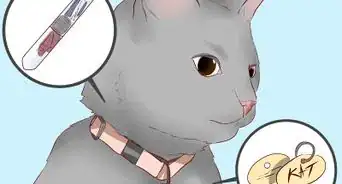


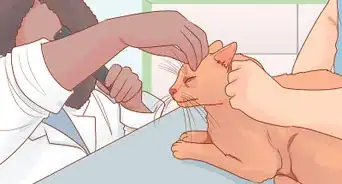

-Step-19.webp)


